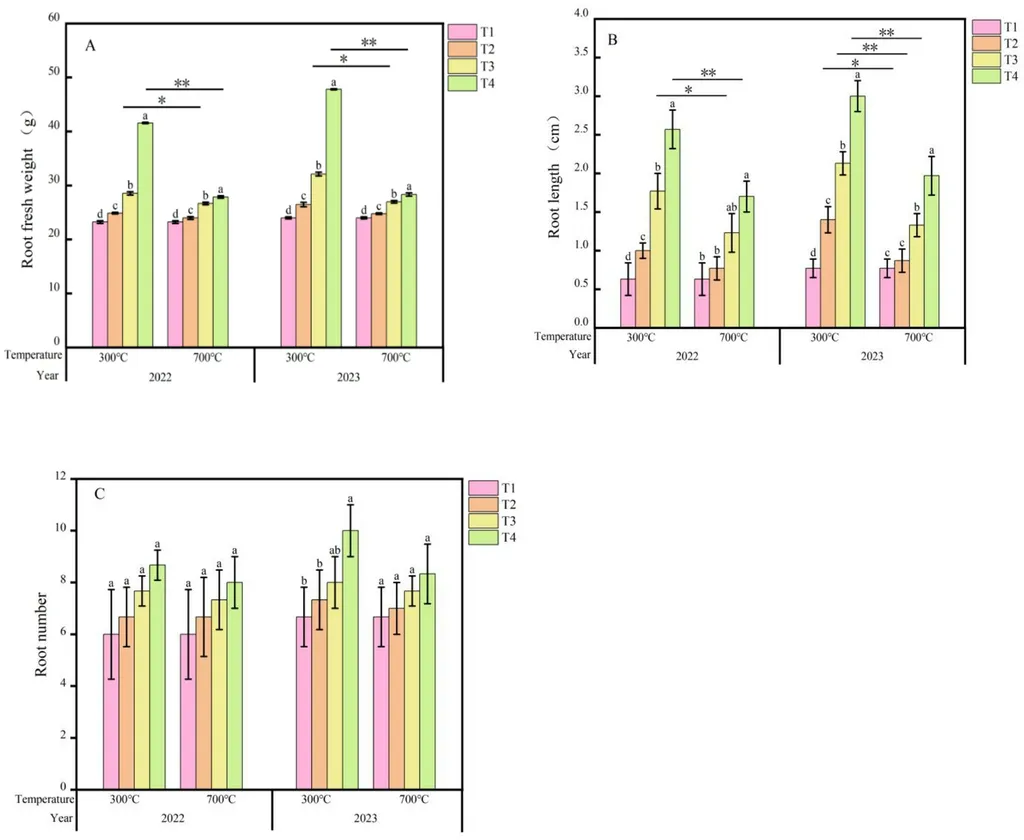In the quest for sustainable agriculture, researchers have uncovered a promising solution that could revolutionize avocado cultivation and contribute to greenhouse gas mitigation. A recent study published in *Scientific Reports* explores the use of date palm waste biochar to enhance avocado growth and soil sustainability, offering a climate-smart approach for the agriculture sector.
Biochar, a carbon-rich material derived from the pyrolysis of biomass, has gained attention for its potential to improve soil fertility and crop productivity. The study, led by Rania A.E. Abdelzaher of the Analysis and Test Center at the Chinese Academy of Tropical Agricultural Sciences, investigated the effects of date palm (Phoenix dactylifera L.) biochar on Fuerte avocado (Persea americana Mill.) seedlings over two years. The biochar was produced at two different pyrolysis temperatures, 300 ℃ and 700 ℃, and incorporated into the growth substrate at various concentrations.
The findings revealed significant improvements in plant growth metrics, including height, trunk diameter, leaf number, leaf area, root length, and fresh biomass. Notably, the treatment with 30% biochar produced at 300 ℃ (T4-300℃) yielded the most substantial benefits, particularly in the second year. “The seedlings treated with this biochar exhibited the highest leaf chlorophyll content and carbohydrate content, reaching peak values of 0.395 mg•g⁻¹ and 24.0 mg•g⁻¹, respectively,” Abdelzaher explained. This treatment also significantly reduced total phenol content, which could facilitate avocado micropropagation.
From an environmental perspective, the application of 30% biochar at 300 ℃ markedly decreased nitrous oxide (N₂O) emissions, while biochar produced at 700 ℃ minimized carbon dioxide (CO₂) emissions in 2023. These results highlight the dual benefits of biochar: enhancing plant growth and mitigating greenhouse gas emissions.
The economic implications of this research are substantial. The 30% biochar treatment demonstrated potential for cost-effective avocado cultivation, supporting sustainable production systems. As the global demand for avocados continues to rise, farmers and agribusinesses are seeking innovative, eco-friendly solutions to meet this demand while minimizing environmental impact. Biochar offers a viable strategy for achieving these goals.
The study’s findings suggest that date palm biochar, particularly at a 30% concentration and a pyrolysis temperature of 300 ℃, could shape future developments in sustainable agriculture. By integrating biochar into cultivation practices, farmers can enhance crop productivity, improve soil health, and contribute to climate change mitigation. This research paves the way for further exploration of biochar applications in various agricultural contexts, potentially transforming the industry’s approach to sustainability.
As the agriculture sector grapples with the challenges of climate change and resource depletion, innovative solutions like biochar offer hope for a more sustainable future. The study led by Abdelzaher and published in *Scientific Reports* provides a compelling case for the adoption of biochar in avocado cultivation, demonstrating its potential to enhance growth, improve soil sustainability, and mitigate greenhouse gas emissions. This research not only advances our understanding of biochar’s benefits but also offers practical insights for farmers and agribusinesses seeking to adopt more sustainable practices.

